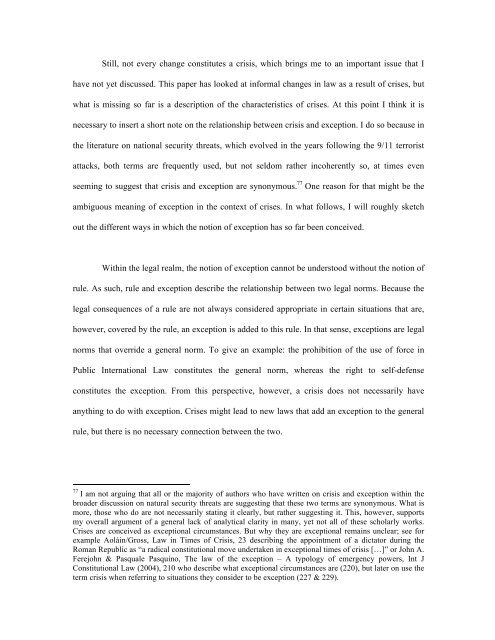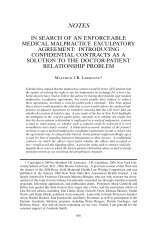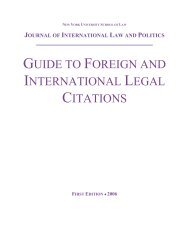Jasper Finke, Crisis and Law - New York University School of Law
Jasper Finke, Crisis and Law - New York University School of Law
Jasper Finke, Crisis and Law - New York University School of Law
Create successful ePaper yourself
Turn your PDF publications into a flip-book with our unique Google optimized e-Paper software.
Still, not every change constitutes a crisis, which brings me to an important issue that I<br />
have not yet discussed. This paper has looked at informal changes in law as a result <strong>of</strong> crises, but<br />
what is missing so far is a description <strong>of</strong> the characteristics <strong>of</strong> crises. At this point I think it is<br />
necessary to insert a short note on the relationship between crisis <strong>and</strong> exception. I do so because in<br />
the literature on national security threats, which evolved in the years following the 9/11 terrorist<br />
attacks, both terms are frequently used, but not seldom rather incoherently so, at times even<br />
seeming to suggest that crisis <strong>and</strong> exception are synonymous. 77 One reason for that might be the<br />
ambiguous meaning <strong>of</strong> exception in the context <strong>of</strong> crises. In what follows, I will roughly sketch<br />
out the different ways in which the notion <strong>of</strong> exception has so far been conceived.<br />
Within the legal realm, the notion <strong>of</strong> exception cannot be understood without the notion <strong>of</strong><br />
rule. As such, rule <strong>and</strong> exception describe the relationship between two legal norms. Because the<br />
legal consequences <strong>of</strong> a rule are not always considered appropriate in certain situations that are,<br />
however, covered by the rule, an exception is added to this rule. In that sense, exceptions are legal<br />
norms that override a general norm. To give an example: the prohibition <strong>of</strong> the use <strong>of</strong> force in<br />
Public International <strong>Law</strong> constitutes the general norm, whereas the right to self-defense<br />
constitutes the exception. From this perspective, however, a crisis does not necessarily have<br />
anything to do with exception. Crises might lead to new laws that add an exception to the general<br />
rule, but there is no necessary connection between the two.<br />
77 I am not arguing that all or the majority <strong>of</strong> authors who have written on crisis <strong>and</strong> exception within the<br />
broader discussion on natural security threats are suggesting that these two terms are synonymous. What is<br />
more, those who do are not necessarily stating it clearly, but rather suggesting it. This, however, supports<br />
my overall argument <strong>of</strong> a general lack <strong>of</strong> analytical clarity in many, yet not all <strong>of</strong> these scholarly works.<br />
Crises are conceived as exceptional circumstances. But why they are exceptional remains unclear; see for<br />
example Aoláin/Gross, <strong>Law</strong> in Times <strong>of</strong> <strong>Crisis</strong>, 23 describing the appointment <strong>of</strong> a dictator during the<br />
Roman Republic as “a radical constitutional move undertaken in exceptional times <strong>of</strong> crisis […]” or John A.<br />
Ferejohn & Pasquale Pasquino, The law <strong>of</strong> the exception – A typology <strong>of</strong> emergency powers, Int J<br />
Constitutional <strong>Law</strong> (2004), 210 who describe what exceptional circumstances are (220), but later on use the<br />
term crisis when referring to situations they consider to be exception (227 & 229).
















